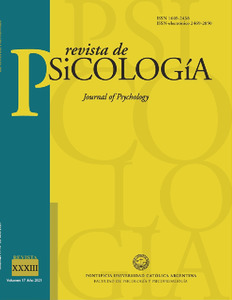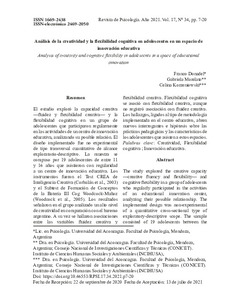Por favor, use este identificador para citar o enlazar este ítem:
https://repositorio.uca.edu.ar/handle/123456789/12688| Título: | Análisis de la creatividad y la flexibilidad cognitiva en adolescentes en un espacio de innovación educativa Analysis of creativity and cognitive flexibility in adolescents in a space of educational innovation |
Autor: | Donadel, Franco Morelato, Gabriela Korzeniowski, Celina Graciela |
Palabras clave: | PSICOLOGIA; CREATIVIDAD; INNOVACION EDUCACIONAL; FLEXIBILIDAD CREATIVA; MUESTREO; TEST CREA DE INTELIGENCIA CREATIVA; ADOLESCENTES | Fecha de publicación: | 2021 | Editorial: | Pontificia Universidad Católica Argentina. Facultad de Psicología y Psicopedagogía | Cita: | Donadel, F., Morelato, G., Korzeniowski, C. G. Análisis de la creatividad y la flexibilidad cognitiva en adolescentes en un espacio de innovación educativa [en línea]. Revista de Piscología. 2021,17 (34). doi: 10.46553/RPSI.17.34.2021.p7-20. Disponible en: https://repositorio.uca.edu.ar/handle/123456789/12688 | Resumen: | Resumen: El estudio exploró la capacidad creativa —fluidez y flexibilidad creativa— y la flexibilidad cognitiva en un grupo de adolescentes que participaron regularmente en las actividades de un centro de innovación educativa, analizando su posible relación. El diseño implementado fue no experimental de tipo transversal cuantitativo de alcance exploratorio-descriptivo. La muestra se compuso por 19 adolescentes de entre 11 y 16 años que asistieron con regularidad a un centro de innovación educativa. Los instrumentos fueron el Test CREA de Inteligencia Creativa (Corbalán et al., 2003) y el Subtest de Formación de Conceptos de la Batería III Cog Woodcock-Muñoz (Woodcock et al., 2005). Los resultados señalaron en el grupo analizado un alto nivel de creatividad en comparación con el baremo argentino. A su vez se hallaron asociaciones entre las variables fluidez creativa y flexibilidad creativa. Flexibilidad cognitiva se asoció con flexibilidad creativa, aunque no registró asociación con fluidez creativa. Los hallazgos, ligados al tipo de metodología implementada en el centro educativo, abren nuevos interrogantes e hipótesis sobre las prácticas pedagógicas y las características de los adolescentes que asisten a estos espacios. Abstract: The study explored the creative capacity —creative fluency and flexibility— and cognitive flexibility in a group of adolescents who regularly participated in the activities of an educational innovation center, analyzing their possible relationship. The implemented design was non-experimental of a quantitative cross-sectional type of exploratory-descriptive scope. The sample consisted of 19 adolescents between the ages of 11 and 16 who regularly attended an educational innovation center. The instruments were the CREA Test of Creative Intelligence (Corbalán et al., 2003) and the Batería III Cog Woodcock-Muñoz Concept Formation Subtest (Woodcock et al., 2005). The results indicated a high level of creativity in the analyzed group compared to the Argentine scale. In turn, associations were found between the variables creative fluency and creative flexibility. Cognitive flexibility was associated with creative flexibility, although it did not register an association with creative fluency. The findings, linked to the type of methodology implemented in the educational center, open new questions and hypotheses about the pedagogical practices and the characteristics of the adolescents who attend these spaces. |
Cobertura Espacial: | Argentina | URI: | https://repositorio.uca.edu.ar/handle/123456789/12688 | ISSN: | 2469-2050 (online) 1669-2438 |
Disciplina: | PSICOLOGIA | DOI: | 10.46553/RPSI.17.34.2021.p7-20 | Derechos: | Acceso abierto | Fuente: | Revista de Piscología. 2021,17 (34) |
| Aparece en las colecciones: | RdP - 2021 Vol. 17 nro. 34 |
Ficheros en este ítem:
| Fichero | Descripción | Tamaño | Formato | |
|---|---|---|---|---|
| cover_issue_349_es_AR.png | 123,81 kB | image/png |  Visualizar/Abrir | |
| analisis-creatividad-flexibilidad.pdf | 941,42 kB | Adobe PDF |  Visualizar/Abrir |
Visualizaciones de página(s)
142
comprobado en 27-abr-2024
Descarga(s)
637
comprobado en 27-abr-2024
Google ScholarTM
Ver en Google Scholar
Altmetric
Altmetric
Este ítem está sujeto a una Licencia Creative Commons

